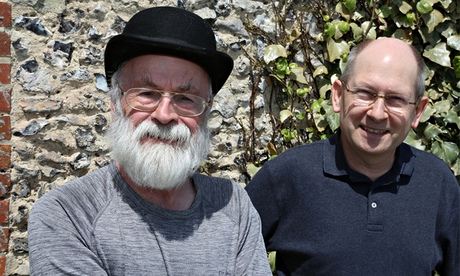At a paltry 883 pages, Fall or, Dodge in Hell is short by Neal Stephenson’s standards. Reamde, from 2011, to which Fall is a sequel, is 1,044 pages long, and his multi-award-winning three-part Baroque Cycle (2003-04) runs to 2,671 pages. You certainly can’t fault him when it comes to giving readers value for money, and not just in terms of pages. A typical Stephenson novel will contain enough plot for two or three regular-sized books, and enough thought-provoking ideas for four or five. And the bonus here: Fall is the best thing he’s written in ages.
In Reamde, games developer Richard “Dodge” Forthrast developed an immersive virtual reality MMORPG – a massively multiplayer online role-playing game – called T’Rain. It made him rich, and provoked a kidnap/terrorism Russian-mafia storyline too intricate to summarise here. Luckily you don’t need to know all the ins and outs of the former novel to enjoy Fall, which starts with Forthrast, now a middle-aged billionaire, waking in his luxurious Seattle apartment. We get a leisurely account of his morning, and of the routine medical procedure he has scheduled. But something goes wrong in the clinic and he dies under anaesthetic. His will instructs that his body be cryonically preserved and his brain scanned neuron by neuron in the hope that technology will eventually be developed that can bring him back to life. Soon enough, virtual reality provides him with just such a second chance.
Reamde, like many of Stephenson’s books, was a Goliath-sized techno thriller, mixing info-dumps and action in a sometimes uneasy novelistic emulsion. Fall is a different sort of beast. The info-dumping is still there, of course – fans would expect nothing less – but this time it’s mixed in with an old-school fantasy novel, exploring the exotic, magical world of its virtual afterlife, Bitworld. There are even maps, although this being Stephenson the maps are in the process of being drawn as the story develops. He doesn’t usually write fantasy. On the evidence of Fall, he ought to do it more often. His Bitworld starts nebulous, coalesces into landscape, and soon enough is giving us warring gods, talking birds, giants, fiery swords, magic forests, fortresses, quests, prophecies and pretty much everything the fantasy fan might hope for.
The scanning process destroys Dodge’s memory, so he wakes amnesiac into his virtual afterlife. As “Egdod”, his avatar from the game world of Reamde, and with the help of various other brains scanned and added to this computer-maintained world, he builds landscapes, biomes and cities, and settles into his post-existence existence. But things don’t run smoothly: a rival intelligence, an unhinged dying billionaire called Elmo Shepherd, enters the realm as “El”, using his superior computing powers to overthrow Egdod and set himself up as a god. It’s engrossing stuff, although the fact that nobody can “die” a second time – they just get rebooted – means that the narrative stakes are never particularly high.
Meanwhile, in the “meatspace” of our world, life goes on. Shortly after Dodge’s death a midwestern town called Moab is destroyed in a nuclear attack. This is quickly shown to be a hoax, orchestrated via faked online video, massively coordinated misinformation and a few holographic special effects, but when the truth is revealed many people refuse to accept it. Fall is, among other things, an interrogation of our lamentably post-truth world, and Stephenson rolls history a couple of decades into the future to depict a US completely unmoored from factual reality. Dodge’s grandniece Sophia travels through the midwestern states of “Ameristan”, where the rules of Leviticus are enforced to the letter and people who break them are stoned (stoning in this case meaning shooting: to Ameristanis “a gun is just a modern labour-saving device that makes it able to throw little rocks really fast”). The satire here is smart and trenchant, if perhaps a little one-sided. There’s some pushback against wealthy Sophia and her coastal elite friends, who monitor every conversation for “microaggressions”, but overall there’s no doubting Stephenson’s dismay at the direction our culture of increasing political and ontological fakery is moving in. The way Stephenson tells it, there was a 300-year period in human history when folk by-and-large found themselves able “to agree on matters of fact not immediately visible to them”. This collective consensus peaked during what he calls “the Cronkite era”, but then “dropped to zero incredibly quickly when the internet came along”. Post-truth turns out to be a grim sort of place to live, although Stephenson’s characters aren’t ones to let the digital grass grow under their virtual feet.
With a book this size there are inevitably longueurs, and although Stephenson eventually fits his “meatspace” and “Bitworld” storylines snugly together, they spend much of the novel tugging in rather different directions. But some narrative effects need bulk to work, and he expertly uses the sheer momentum he builds up in this enormous story. This is a novel with genuine heft. It keeps you reading, it makes you think, and, by the end, it generates that sense of wonder that is the very lifeblood of science fiction and fantasy. Stephenson’s digital afterlife reminded me a little of CS Lewis’s Narnia books, where heaven is described as a novel that goes on for ever and in which every chapter is better than the one before. In the wonderful and frightening world of Fall, there are many consolations to be had.
• Adam Roberts’s The Real-Town Murders is published by Gollancz. Fall or, Dodge in Hell by Neal Stephenson is published by William Morrow (RRP £20). To order a copy go to guardianbookshop.com or call 0330 333 6846. Free UK p&p over £10, online orders only. Phone orders min p&p of £1.99.











